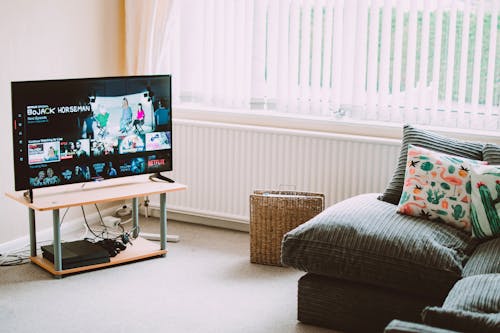
If you recently binged on horror movies during Halloween, you might have felt happier. In fact, you might be surprised to learn that there are backed up health benefits of watching horror movies.
Evenings spent watching chainsaw-wielding maniacs chase camp counsellors might not sound like the best way to improve your mental health. However, scientific studies have proven that horror movies, in all their gory glory, can be a powerful tool for combating anxiety and other common conditions.
Now, this might not be true for everyone, but if you enjoy scary movies, watch one the next time you’re feeling anxious, and see what happens.
Curious about the mental health benefits of watching horror movies? One particularly recent study found that horror movie fans, and people defined as “morbidly curious” have actually had fewer negative mental health symptoms during the pandemic. This isn’t a one-off discovery, either. Various other reports have concluded that horror movies are excellent for reducing stress and boosting your mood.
Watching horror movies from time to time is a great way to get a thrill – but it’s also a fantastic way to start learning how to regulate your emotions. Let’s explore the mental health benefits of watching horror movies in more detail below:
Scream Away the Stress: The Benefits of Watching Horror Movies
Though the concept of improving your mental health via exposure to horror movies might sound a little unusual at first, it will make more sense when we dive into the science behind why.
One of the main reasons horror movies can be so fantastic for mental health is because they help you to build genuine resilience. When you watch a scary movie, your brain releases fear responses similar to if you were actually experiencing what was happening in that movie yourself.
In other words, while watching the movie, your heart starts racing, you breathe more heavily, and your nervous system releases waves of adrenaline and cortisol (the stress hormone). While this might not feel like fun at the time, watching the scary movie is making you mentally stronger, scene by scene.
Just like exercising your muscles in the gym makes you physically stronger, exercising your ability to cope with feelings of fear and panic improves your ability to handle scary situations. During a stressful watching experience, you’re actively (and voluntarily) exposing yourself to stimuli that provoke anxiety, and you’re learning how to manage stress at the moment. You’re building valuable anxiety management skills.
In simple terms, horror movies gradually teach us that no matter how terrified we feel in a specific moment, we can survive that fear, and live another day.

Feeling Fear Can Be a Great Emotional Release
Just like there are health benefits of crying, there are also health benefits of watching horror movies and feeling afraid for a temporary moment. Aside from gradually building your resilience in the face of fear, horror movies can have a positive influence on your mental health in other ways as well.
Wes Craven, the acclaimed director behind “Nightmare on Elm Street”, once explained wisely that horror films don’t actually create fear, they allow us to “release our fears”. When you’re watching a horror movie, you’re controlling your exposure to fear, and releasing stress in a strategic fashion.
You still get to determine exactly how afraid you let yourself get when watching a scary movie. If you feel too scared, you can mute the movie (the absence of the scary music makes the film 10 times less scary). You can also turn the film off if you get too overwhelmed, cover your eyes with your hands, or turn all the lights on in the house. You also know, realistically, where the fear is coming from. The fear is coming from the movie, and you understand that you’re actually in a safe space. This is a far more comfortable way of dealing with fear.
Watching a horror movie can be particularly helpful when you’re scared or worried about something in real life. In 2020, when the COVID-19 pandemic was causing worldwide panic, horror sales increased on the app “Movies Anywhere” by 194%.
People started turning to horror movies for an escape because they recognised them as something they could control. In a global pandemic, horror allowed us to release some of the internal anxiety and stress we were feeling in a healthy way, rather than feeling completely out of control.
Feeling fear also gives you a way of focusing your mind and taking attention away from the personal problem you’re currently worried about. When we watch a horror movie, our bodies enter fight-or-flight mode, and we’re heavily invested in what’s happening on the screen. It’s hard to think about what’s going on outside when you’re tuned in to a monster on your TV set.
Horror is a great distraction when you’re stuck on the same hamster wheel of panic in your head. These movies also give you a sense of closure. When the monster is eliminated or the movie ends, your sense of panic naturally drains away.
Using Horror Movies to Face Our Fears
Used correctly, horror movies are an excellent tool for making friends with fear, by allowing you to face the things you’re afraid of in a controlled environment.
There are actually therapeutic practices that use the same strategy. Exposure therapy gives you small tastes of things that trigger your fear and anxiety and helps to desensitize you from those triggers. Horror movies work in a similar way, providing information and insights to help you see that the things you’re afraid of might not be as terrible as you think.
The key to success, as with most things, is finding the right horror movie for you.
Although studies show people with anxiety and high levels of stress can benefit from horror films, those with anxiety disorders can also find horror movies make their symptoms worse. If you’re terrified of spiders, for instance, you might not benefit from diving straight into a horror movie about killer arachnids.
Before you start shopping for possible stress relief in the form of horror movies:
Know your triggers:
Know which things are likely to frighten you more than others. If you’re going to be particularly scared watching a specific movie, it might be something you want to work up to.
Saying that, it’s essential for the horror movies you choose to be scary enough to stimulate your fear response if you want to see the benefits. Try and find a balance between being afraid and feeling overwhelmed.
Experiment:
The best way to see which movies stimulate your fear response is to experiment with different options. Some people feel more terrified watching found footage movies, while others are engaged by psychological thrillers. There are plenty of different sub-genres to explore while you’re figuring out what works for you.
Experimenting with different styles of horror will help you to explore the range of “fear” emotions you can experience, and how you cope with them. Plus, it’s a good way to have some fun.

Maintain control:
Remember you can always turn the movie off if you need to. Any mental benefits of watching a scary movie will likely disappear if you’re forcing yourself to sit through it. You still need to feel like you’re in control, or you risk entering “trauma” territory.
To make yourself feel more comfortable, you can always consider implementing certain safety blankets into your watching experience too. For instance, you can keep the lights on, or watch a movie during the day so you feel less frightened.
Don’t watch horror movies alone:
You don’t have to face your fears solo. It’s probably best to start watching scary movies with people you care about if you’re a beginner. Try having someone nearby who can reassure you and make you feel protected while you watch.
The great thing about watching horror movies with a friend, is you feel safer, and you also get an opportunity to strengthen your bond with that person. Snuggling up to a new partner during a horror movie at the beginning of a relationship can help to strengthen your trust and appreciation of that person.
Try a different medium:
If you feel a little out of your league in the horror movie landscape right now, why not try starting somewhere else? Listening to a horror podcast or audiobook means you’re not actually seeing the visuals accompanying the story. This can make the experience less overwhelming.
You can also consider picking up a novel and using that to test your fear response. Many of the most popular horror movies of all time, like “It” and “The Shining” started as books. Since reading is less immersive, it can tone down the horror.
Using Horror Films for Mental Health the Right Way
Horror movies can be an excellent tool for reducing anxiety, improving your emotional resilience, and giving you a sense of release. More than just a fun way to end a Friday night, a horror movie is an investment in your mental health – if you know how to use this technique correctly.
Just remember that not everyone will respond to horror movies in the same way. If you find watching horror movies to be overwhelming, then you may need to find a better way of managing your anxiety. The mental health benefits of watching horror movies won’t work for everyone, so don’t keep doing it if it’s not helping you.
You can also get a DNA test to find out whether your genetics make you more predisposed to issues such as worry, neuroticism, anxiety and stress.
One of the best ways to manage mental health struggles such as anxiety or stress is to experiment with different coping strategies. Why not try out the horror film strategy and see if it works for you? Figuring out what helps you cope is all about experimentation.






